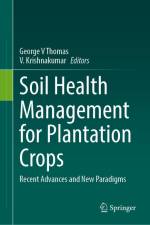av George V Thomas
3 117
This edited volume elucidates state-of-the-art information and provides new paradigms of soil health-based pathways for sustaining plantation crops and diversified systems. The book covers soil characteristics, soil fertility constraints, issues of soil contamination, the impact of climate change on plantation soils, indicators of soil health and soil health assessment, fertility management for healthy soils, soil amendments, soil biodiversity, and biological functions and micro-biome as well as meta-genomic approach.Plantation crops are perennials, cultivated in tropical and sub-tropical agroecosystems in a contiguous area, and comprise estate crops which include tea, coffee, and rubber and small holders¿ plantation crops such as coconut, areca nut, oil palm, cashew, cocoa, and spices. These are high-value crops with considerable significance in livelihood security, commerce, and trade, and are grown in ecologically vulnerable regions such as coastal belts, hilly areas, andregions with high rainfall and high humidity, which makes maintenance of soil health a major challenge. Sustainable agricultural production depends on the health, quality, and functionality of the soil. The book includes technological options to achieve sustainable production encompassing soil health improvement through multi-strata, multi-species cropping systems, integrated farming systems, conservation agriculture practices, cover cropping and green manuring, crop residue recycling, bio-fertilizer and bio-stimulant technologies and organic farming systems.This book is an essential resource for researchers, plantation professionals, educators, and policymakers. It provides valuable insights and practical solutions for addressing emerging issues in soil health management and is a must-read for students of agriculture, forestry, ecology, microbiology, soil science, and environmental sciences.

